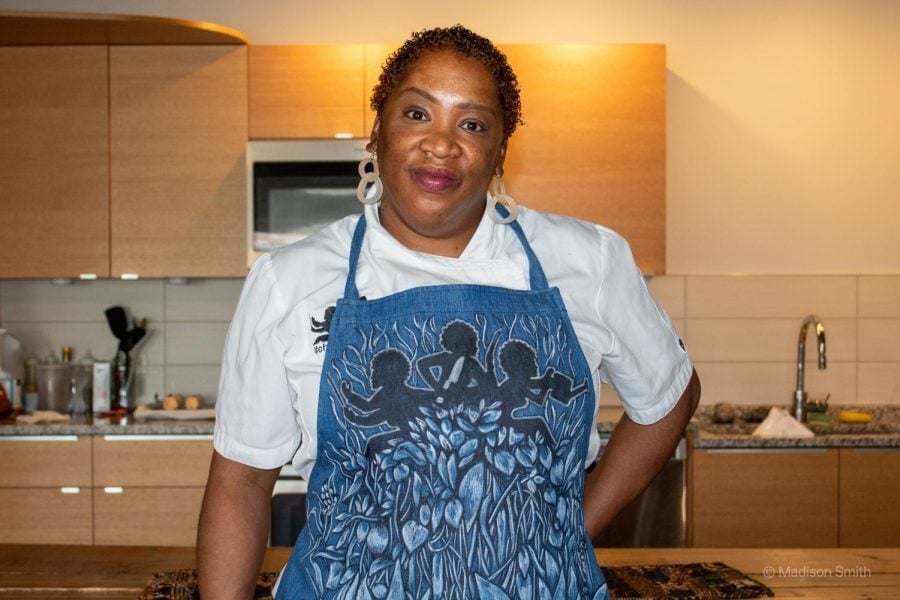Q&A: CNN Hero Chef Q. Ibraheem shares cooking and service inspirations
Madison Smith/Daily Senior Staffer
Chef Q. Ibraheem was recently featured as one of CNN’s “CNN Heroes” of 2021 for her free food program Kids with Coworkers.
July 4, 2021
Before she pivoted to focus on feeding families in Evanston, Chef Q. Ibraheem ran a high-end underground supper club — Teertsemasesottehg, or “ghetto Sesame Street” backwards — that catered to an elite clientele and encouraged cross-community building and exposure. While she was also involved in multiple initiatives combating food insecurity and teaching children in Chicagoland how to grow vegetables and cook healthy meals, the pandemic shifted her passion more toward providing for her local community. Since the onset of COVID-19, Ibraheem has provided around 60,000 meals to more than 600 people. The Daily sat down with Ibraheem to learn more about her inspirations in cooking and service.
The conversation has been edited for clarity and brevity.
The Daily: Can you give an example of an inspiration or influence you have had in your cooking and relationship with food?
Ibraheem: My mom got a job when I was 11, and we never had a family vacation, but she (would) say we’re still going to travel. So every paycheck, which was twice a month, she would take me to a different part of the world through restaurants. We would just talk about the culture over the meal, and that’s how we (would) travel. It was only just a tunnel bus away. We would go to Italy, China, Greece, France, and it was always through restaurants. But she made it such a dope experience. It really opened my mind up because cultures are so different and so beautiful, but we’re not always exposed to them. Everyone thinks you got to go (to the country), but a restaurant is a hell of a way to do it.
The Daily: In addition to Teertsemasesottehg, you are involved and leading many initiatives combating food insecurity locally. Where do you find the motivation and inspiration to keep fighting for food equity?
Ibraheem: My great-great-grandmother, my grandmother, my great-grandmother and my mom all lived in Evanston. Most of my family was from the fifth ward of Evanston. As soon as I got here, I realized it was the only designated food desert in Evanston. I started thinking about food insecurity, knowing that it was a food desert. So I joined the board of the Evanston Food Exchange, and now I’m the president of the board where we fight food insecurity.
The Daily: CNN recently featured you and your free meal program, Kids with Coworkers, in its “CNN Heroes” series. What inspired you to launch this program in the beginning of the pandemic when you yourself were facing the financial challenges of your underground supper club being closed?
Ibraheem: It was just really important since I figured what was going on in our community. I focus so heavily on building community; if you live in a community, you give to it. When the pandemic happened, I was on the phone with a parent who said she had five kids in the house and two cans of mushroom soup. And after that day, I was like, “The people, families that I know, I’m just going to cook for them.” There has been so much loss of finance and life and just everything about food insecurity. It’s heartbreaking. It’s still heartbreaking.
The Daily: How do these two parts of your passion — the underground supper club and fighting food insecurity — mix together and influence one another?
Ibraheem: You see my logo on my mask (and apron). I made this logo when I was just a chef. The left figure represents education; on the right I got the farmer, the spout and the one in the middle is the chef. This is all I had. And I was like, “This is what I’m going to do. Today I’m doing all of this.” When I wake up in the morning, I ask the universe to use me where I’m needed. I ask for the universe to lead me in purpose, so that I’m on my spiritual purpose for whatever reason I’m here, and that I continue to do what I need to do to fulfill it. I just think that’s what it is.
Email: gracewu2023@u.northwestern.edu
Related Stories:
— Lasagna Love Mamas and Papas address food insecurity, deliver home-cooked meals
— Pinto Thai Kitchen donates meals, fights food insecurity
— Evanston food assistance programs adapt to pandemic precautions amidst growing food insecurity


